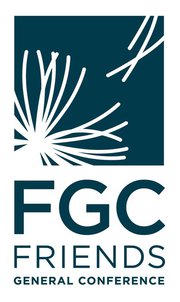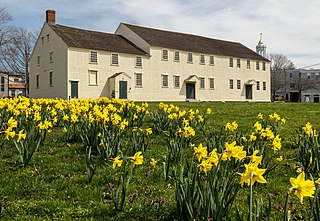
Friends General Conference (FGC) is an association of Quakers in the United States and Canada made up of 16 yearly meetings and 12 autonomous monthly meetings. "Monthly meetings" are what Quakers call congregations; "yearly meetings" are organizations of monthly meetings within a geographic region. FGC was founded in 1900.

Friends United Meeting (FUM) is an association of twenty-six yearly meetings of the Religious Society of Friends (Quakers) in North America, Africa, and the Caribbean. Its home pages states that it is "a collection of Christ-centered Quakers, embracing 34 yearly meetings and associations, thousands of local gatherings and hundreds of thousands of individuals". In addition there are several individual monthly meetings and organizations that are members of FUM; FUM's headquarters is in Richmond, Indiana, with offices in Kisumu, Kenya. Friends United Meeting is a member of the National Council of Churches in the United States of America, and is a global member of the World Council of Churches.
The views of Quakers around the world towards homosexuality encompass a range from complete celebration and the practice of same-sex marriage, to the view that homosexuality is sinfully deviant and contrary to God's intentions for sexual expression. The Religious Society of Friends (Quakers) is a historically Christian religious movement founded in 17th-century England; it has around 350,000 members. In Britain, Canada, New Zealand and Australia, many Quakers are supportive of homosexual relationships, while views are divided among U.S. meetings. Many Conservative Friends and Holiness Friends, both of which have retained traditional Quaker practices such as plain dress, along with Evangelical Friends, view homosexual acts as sinful. 49% of Quakers live in Africa, and though views may differ, the Kenyan Church of Friends does not support homosexual relationships.
Meeting for Sufferings is an executive committee of Britain Yearly Meeting, the body which acts on behalf of members of the Religious Society of Friends (Quakers) in Great Britain and the Crown Dependencies. It has about 200 members who meet five times a year to make decisions when the Yearly Meeting is not in session.

The Yearly Meeting of the Religious Society of Friends (Quakers) in Britain, also known as Britain Yearly Meeting, is a Yearly Meeting of the Religious Society of Friends (Quakers) in England, Scotland, Wales, the Channel Islands and the Isle of Man. It is the national organisation of Quakers living in Britain. Britain Yearly Meeting refers to both the religious gathering and the organisation. "Yearly Meeting", or "Yearly Meeting Gathering" are usually the names given to the annual gathering of British Quakers. Quakers in Britain is the name the organisation is commonly known by.

Quaker weddings are the traditional ceremony of marriage within the Religious Society of Friends. Quaker weddings are conducted in a similar fashion to regular Quaker meetings for worship, primarily in silence and without an officiant or a rigid program of events, and therefore differ greatly from traditional Western weddings. In some respects a Quaker marriage resembles a common-law marriage.

Evangelical Friends Church International (EFCI) is a branch of the Society of Friends (Quaker) yearly meetings located around the world. This branch makes up most Evangelical Quaker meetings from the Gurneyites. The EFCI is generally more conservative in their orientation than other Quaker meetings and has many similarities to other denominations of Evangelicalism. The original EFCI, known as the Association of Evangelical Friends, was formed in 1947. The EFCI adopted its current name in 2004 and is a member of the National Association of Evangelicals and the World Evangelical Alliance. Despite their differences from other Friends, they are a member of the interdenominational Friends World Committee for Consultation. After the switching of around 7,000 Friends from the Friends United Meeting in California to the EFCI, Evangelical Friends became the largest branch of Friends in the United States.
The Philadelphia Yearly Meeting of the Religious Society of Friends, or simply the Philadelphia Yearly Meeting, or PYM, is the central organizing body for Quaker meetings in the Philadelphia, Pennsylvania, United States area, including parts of Pennsylvania, Maryland, Delaware and New Jersey. The PYM is primarily affiliated with the Friends General Conference and is a member of the National Council of Churches.

Yearly Meeting is an organization composed of constituent meetings or churches of the Religious Society of Friends, or Quakers, within a geographical area. The constituent meetings are called Monthly Meetings in most of the world; in England, local congregations are now called Area Meetings, in Australia Monthly Meetings are called Regional Meetings. "Monthly" and "Yearly" refer to how often the body meets to make decisions. Monthly Meetings may be local congregations that hold regular Meetings for Worship, or may comprise a number of Worship Groups. Depending on the Yearly Meeting organization, there may also be Quarterly Meetings, Half-Yearly Meetings, or Regional Meetings, where a number of local Monthly Meetings come together within a Yearly Meeting.

Within the Religious Society of Friends, a clerk is someone responsible for various administrative functions within a meeting for worship for church affairs or meeting for worship with attention to business. The clerk is responsible for recording the discernment which is arrived at during such a meeting, in a minute, and is responsible for sending and receiving correspondence on behalf of the meeting. Within some branches of the Religious Society of Friends, the clerk may also create an agenda and may facilitate the meeting.

Conservative Friends are members of the Wilburite branch of the Religious Society of Friends (Quakers). In the United States, Conservative Friends belong to three Yearly Meetings: the Ohio Yearly Meeting (Conservative), the North Carolina Yearly Meeting (Conservative), and the Iowa Yearly Meeting (Conservative). Of these, the Ohio Yearly Meeting is the most traditional. English Friends affiliated with the Conservative branch of Quakerism are organized as the Friends in Christ and tend to use the terms Primitive or Plain.

Quakers are people who belong to the Religious Society of Friends, a historically Protestant Christian set of denominations. Members refer to each other as Friends after John 15:14 in the Bible, and originally, others referred to them as Quakers because the founder of the movement, George Fox, told a judge to quake "before the authority of God". The Friends are generally united by a belief in each human's ability to be guided by the inward light to "make the witness of God" known to everyone. Quakers have traditionally professed a priesthood of all believers inspired by the First Epistle of Peter. They include those with evangelical, holiness, liberal, and traditional Quaker understandings of Christianity, as well as Nontheist Quakers. To differing extents, the Friends avoid creeds and hierarchical structures. In 2017, there were an estimated 377,557 adult Quakers, 49% of them in Africa followed by 22% in North America.

Quakers are members of a Christian religious movement that started in England as a form of Protestantism in the 17th century, and has spread throughout North America, Central America, Africa, and Australia. Some Quakers originally came to North America to spread their beliefs to the British colonists there, while others came to escape the persecution they experienced in Europe. The first known Quakers in North America arrived in the Massachusetts Bay Colony in 1656 via Barbados, and were soon joined by other Quaker preachers who converted many colonists to Quakerism. Many Quakers settled in the Colony of Rhode Island and Providence Plantations, due to its policy of religious freedom, as well as the British colony of Pennsylvania which was formed by William Penn in 1681 as a haven for persecuted Quakers.

The Third Haven Meeting House is generally considered the oldest-surviving Friends meeting house of the Religious Society of Friends in America, and it is a cornerstone of Quaker history in Talbot County, Maryland.

A Friends meeting house is a meeting house of the Religious Society of Friends (Quakers), where meeting for worship is usually held.
New York Yearly Meeting of the Religious Society of Friends, or simply New York Yearly Meeting or NYYM, is the central organizing body for Quaker meetings and worship groups in New York State, northern and central New Jersey, and southwestern Connecticut.

The Quakers have had a presence in Canada since 1670, when Charles Bayly was sent to be the governor of the Hudson's Bay Company. Early Quaker settlements were attempted in New Brunswick, Nova Scotia, Prince Edward Island and at Farnham in Quebec in the late 1700s. Permanent communities were realised at Adolphustown on the Bay of Quinte and at the same time at Pelham in the Niagara District before 1800. Quakers immigrated to Canada from New York, the New England States, and Pennsylvania.
The New Association of Friends is a Friends (Quaker) organization in the US.
The Progressive Friends, also known as the Congregational Friends and the Friends of Human Progress, was a loose-knit group of dissidents who left the Hicksite branch of the Society of Friends (Quakers) in the mid-nineteenth century. The separation was caused by the determination of some Quakers to participate in the social reform movements of the day despite efforts by leading Quaker bodies to dissuade them from mixing with non-Quakers. These reformers were drawn especially to organizations that opposed slavery, but also to those that campaigned for women's rights. The new organizations were structured according to congregationalist polity, a type of organization that gives a large degree of autonomy to local congregations. They were organized on a local and regional basis without the presence of a national organization. They did not see themselves as creators of a new religious sect but of a reform movement that was open to people of all religious beliefs.

The Quaker business method or Quaker decision-making is a form of group decision-making and discernment, as well as of direct democracy, used by Quakers, or 'members of the Religious Society of Friends', to organise their religious affairs. It is primarily carried out in meetings for worship for business, which are regular gatherings where minutes are drafted, to record collective decisions.